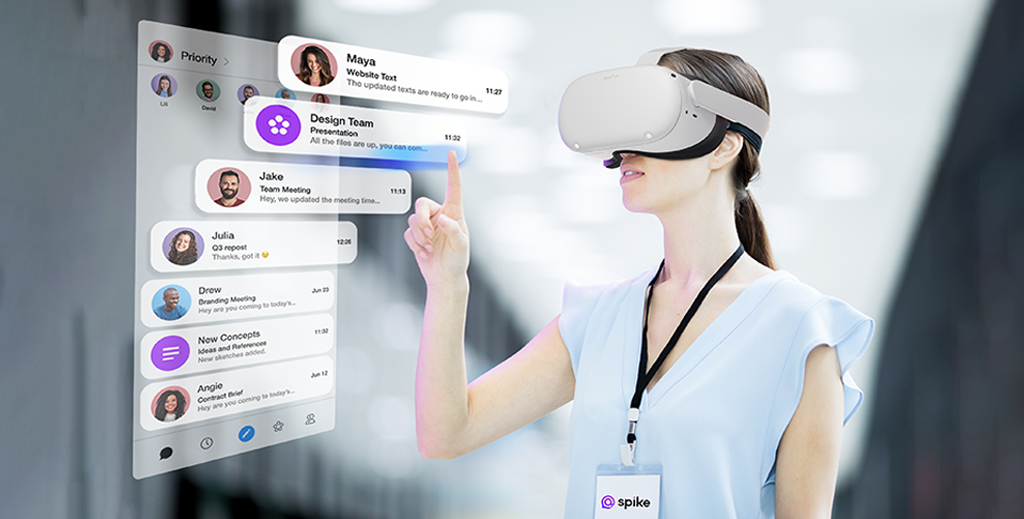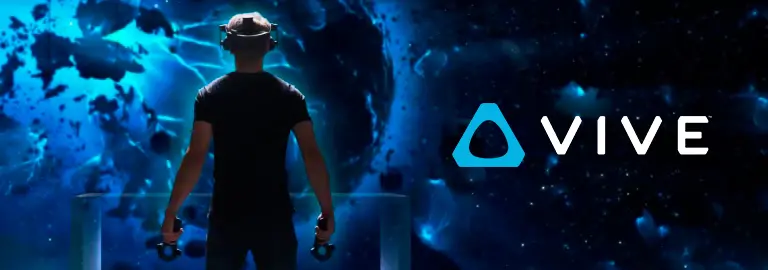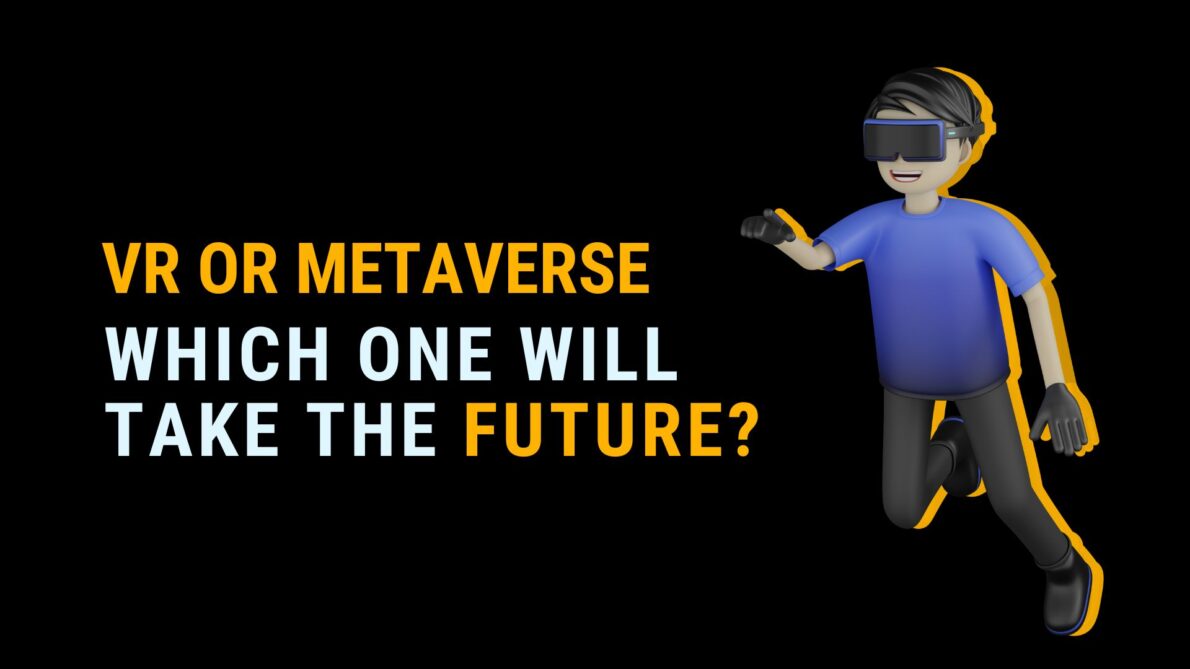A VR headset is a head-mounted device that includes a display screen, stereo sound, sensors, and controllers to deliver an immersive and interactive AV experience when using.
When VR headset is put on by user, they can’t longer see the world around them, but instead only see Virtual Reality content projected on the display screen such as 360-degree videos and VR games, workspaces, or meeting rooms.
Unlike augmented reality (AR) headsets or mixed-reality (MR) headsets, VR headsets do not allow users to see any element of the external physical world.
What Metaversum offers?
Metaverse is a virtual world that offers a wide range of immersive experiences to its users. It is a platform where people can interact with each other and engage in various activities, all while in a virtual setting.
One of the most popular offerings of the Metaverse is gaming, where users can enjoy games in a VR experience, collaborate with others or challenge them. The platform offers a variety of games, from simple ones to complex, multiplayer games.
Another feature of the Metaverse is virtual meetings and virtual offices. Horizons Workrooms enables users to meet and collaborate with their team, regardless of where they are in the world. The virtual reality experience creates a more immersive and empathetic environment for remote work and communication.
Virtual events are also popular in the Metaverse, with Horizon Venues offering a platform for hosting and attending events in a virtual setting. This feature is especially useful for businesses and organizations that want to reach a global audience and provide a unique and interactive experience for their attendees.
Additionally, users can create and customize their own virtual worlds in the Metaverse, offering them a space to express themselves and their creativity. This feature allows users to build their own world and share it with others.
Overall, Metaverse offers a vast array of experiences, from gaming to virtual meetings, events, and personal creativity, all in an immersive and interactive virtual world.
Viverse is a virtual world that offers a wide range of immersive experiences to its users. The platform provides users with their very own personal space where they can work, relax, and escape from their daily routine. With a collection of private VR spaces to choose from, users can customize their experience to meet their specific needs.
For art lovers, Viverse offers access to the Louvre and other notable exhibits in a virtual setting. Users can attend exhibitions with their family and friends or take themselves on a date and immerse themselves in the world of art. With HTC VIVE’s commitment to integrating art with technology, users can witness the masterpieces of great artists brought to life right before their eyes.
Music enthusiasts can enjoy virtual concerts with a premium view and a highly interactive experience. With holographic imaging and a 360-degree viewing angle, Beatday ensures that users have an unforgettable experience.
Viverse also offers a unique space for social gatherings. For example, users can participate in a virtual wine tasting with their friends and see the wine’s details displayed before their very eyes. With the platform’s immersive experience, users can relax and enjoy wine with their friends as if they were right beside them.
Remote work and collaboration are made more immersive and empathetic in Viverse’s virtual reality environment. The platform enables users to meet and collaborate with their team, regardless of their location in the world. Viverse provides an avenue for businesses and organizations to unite and connect with their team, even when they are halfway across the world.
Gamers can enjoy a variety of games in a VR experience, collaborate with others or challenge them. With the platform’s unique approach to gaming, users can enjoy simple to complex multiplayer games in a highly interactive and immersive environment.
Viverse also enables users to orchestrate or participate in trade shows and expos in a virtual setting. With VR, users can showcase their product or service in the most interesting way possible, ensuring a more nuanced experience for their clients.
Finally, Viverse offers a low latency live-streaming experience through its new 5G solution, Reign Core. Designed for large crowds, Reign Core enables high-speed connectivity and is highly portable, making it an ideal choice for events such as the Super Bowl or Coachella.

Which technologies will be developed in Metaversum?
-
Blockchain – is a type of distributed ledger technology (DLT) that consists of growing lists of records, called blocks, that are securely linked together using cryptography. Each block contains a cryptographic hash of the previous block, a timestamp, and transaction data (generally represented as a Merkle tree, where data nodes are represented by leaves). The timestamp proves that the transaction data existed when the block was created. Since each block contains information about the previous block, they effectively form a chain (compare linked list data structure), with each additional block linking to the ones before it. Consequently, blockchain transactions are irreversible in that, once they are recorded, the data in any given block cannot be altered retroactively without altering all subsequent blocks.
-
Cryptocurrency – is a digital currency designed to work as a medium of exchange through a computer network that is not reliant on any central authority, such as a government or bank, to uphold or maintain it. It is a decentralized system for verifying that the parties to a transaction have the money they claim to have, eliminating the need for traditional intermediaries, such as banks, when funds are being transferred between two entities.
-
Augmented Reality – is an interactive experience that combines the real world and computer-generated content. The content can span multiple sensory modalities, including visual, auditory, haptic, somatosensory and olfactory.AR can be defined as a system that incorporates three basic features: a combination of real and virtual worlds, real-time interaction, and accurate 3D registration of virtual and real objects.The overlaid sensory information can be constructive (i.e. additive to the natural environment), or destructive (i.e. masking of the natural environment).This experience is seamlessly interwoven with the physical world such that it is perceived as an immersive aspect of the real environment.In this way, augmented reality alters one’s ongoing perception of a real-world environment, whereas virtual reality completely replaces the user’s real-world environment with a simulated one.
-
Virtual Reality – Currently, standard virtual reality systems use either virtual reality headsets or multi-projected environments to generate realistic images, sounds and other sensations that simulate a user’s physical presence in a virtual environment. A person using virtual reality equipment is able to look around the artificial world, move around in it, and interact with virtual features or items. The effect is commonly created by VR headsets consisting of a head-mounted display with a small screen in front of the eyes, but can also be created through specially designed rooms with multiple large screens.
-
Artificial Intelligence – is intelligence—perceiving, synthesizing, and inferring information—demonstrated by machines, as opposed to intelligence displayed by animals and humans. Example tasks in which this is done include speech recognition, computer vision, translation between (natural) languages, as well as other mappings of inputs. The Oxford English Dictionary of Oxford University Press defines artificial intelligence as:
-
Internet of Things – describes physical objects (or groups of such objects) with sensors, processing ability, software and other technologies that connect and exchange data with other devices and systems over the Internet or other communications networks.[1][2][3][4][5] Internet of things has been considered a misnomer because devices do not need to be connected to the public internet, they only need to be connected to a network[6] and be individually addressable
-
5G / 6G – is technology standard of celluar connectivity, every generation or revision increase possible speed of mobile internet, which is very important in Metaversum, due of big ammount data transfer required to enjoy it.
Is Metaversum the technology of tommorow?
Absolutely yes! This technology will change the world we are living.
-
Probably we won’t need to travel half of the world to join meetings
-
Probably we won’t need to travel physicaly, to discover new places in the world or even cosmic space
-
Probably we will be able to enjoy any others activities with friends
-
Probably we will be able to try on new clothes, without visiting the shop
-
Probably we will be able to do training online (for example deconstructing the items in order to know how to fix them, exchange them)
What are challanges to Metaversum?
-
Security – is one of the primary issues that have cropped up with an increase in the value of crypto transactions and the increase in crypto scams and malicious softwares. If meteverse is a serious project that is here to stay, it needs to improve its security standards to give users the confidence that their identity and assets are safe and secure.
-
Privacy – is another issue which has haunted the metaverse. Considering the fact that the metaverse uses devices such as webcams and AR & VR technology, it indeed makes the privacy of the user susceptible to being compromised. It is a known fact that hackers have in the past hacked and exploited such devices to spy on people. So, for the metaverse to be used by the masses, such risks to privacy must be addressed and solutions be addressed.
In conclusion, the Metaverse is a groundbreaking technology that provides users with a vast array of immersive experiences, from gaming to virtual meetings, events, and personal creativity. It has the potential to change the way we interact with each other, work, and even travel.
However, the Metaverse faces some significant challenges that must be addressed to ensure its long-term success. Security and privacy are two of the primary concerns that must be addressed to give users the confidence that their assets and personal information are secure.
Despite these challenges, the potential of the Metaverse is enormous, and its future looks bright. As the technology continues to develop, we can expect even more innovative and immersive experiences that will revolutionize the way we live and interact with each other.
In the years to come, we can expect to see the Metaverse grow and evolve, becoming an essential part of our daily lives. As such, it is crucial to continue investing in the development and security of this technology to unlock its full potential and provide users with an unforgettable experience that is safe and secure.
